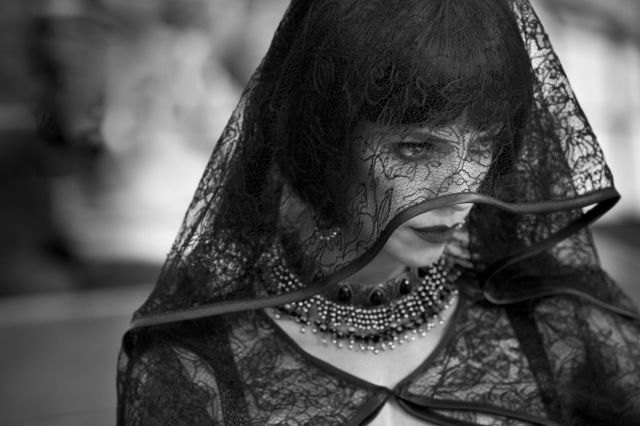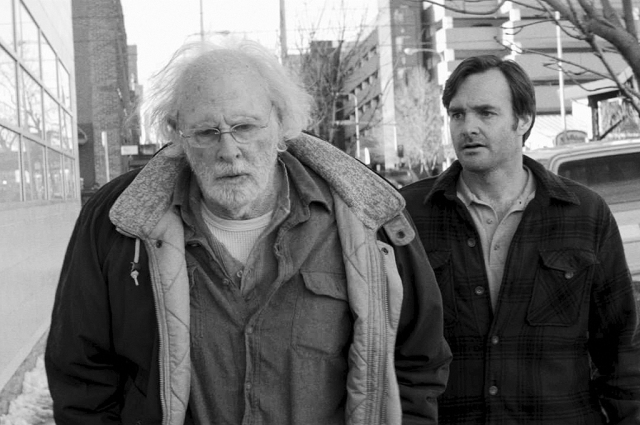Earlier in the year, while browsing through the selection of film books at the local library, I came across a copy of Francois Truffaut’s Hitchcock, the famous interview the French New Wave auteur conducted with the Master of Suspense. It was a fascinating read, full of interesting anecdotes and little nuggets of wisdom. Most memorable for me was Hitchcock’s idea of requiring every film student to make a silent film, so they would learn to tell their stories purely through the visuals, without relying on dialogue to fill in any gaps in imagination. It’s an idea director Pablo Berger seems to have taken to heart with Blancanieves, a silent reimagining of the classic Snow White fairytale that transposes the action to 1920s Spain. With her mother dead from childbirth and her matador father paralyzed from a bullfighting accident, the fairest of them all finds herself mainly in the care of others as a child, eventually and most ominously her evil stepmother (wonderfully played by Maribel Verdu). I would imagine most everyone is familiar with the original fairytale, so it should come as no surprise when “Snow White” flees from her stepmother and finds herself among a company of dwarves, here re-imagined as a traveling band of bullfighters.
It’s difficult to talk about a silent production in this day and age without bringing up a specific Oscar winner from recent history. Blancanieves is less of a crowd pleaser than 2011’s The Artist, but it feels like a more valiant and successful experiment. The Artist, while a film of many strengths and charms, was constantly reminding the viewer that its existence was essentially a novelty. Blancanieves plays everything straighter, and without the jokey approach and “nudge-nudge wink-wink” moments of self-aware levity, it’s amazing how quickly one forgets about the complete absence of dialogue. With little reliance on intertitles, Berger instead advances his story mainly through clever visual metaphors (my favorite: a girl’s white dress being dyed black for a funeral). It helps too that Berger doesn’t completely constrain his approach to match the filmmaking standards of the silent era. The film is a more diverse blend, with the classical visuals and expressionistic shadow work mixing in with inventive, almost New Wave-style editing techniques. Paying homage to the past while also delivering something fresh and exciting is not an easy balance to find, as many recent filmmakers have found out the hard way. But by using the past as inspiration, Berger finds a way to make this classic story feel new again. 8/10.
When did mainstream animation become so disposable? It’s a question I couldn’t help asking myself when I was sitting through the previews in front of Disney’s latest animated effort. One by one the previews went by, each advertising a similar-looking product, filled with wisecracking anthropomorphic creatures, cheap lowbrow gags, and voiceover work from “celebrities” chosen for their name recognition rather than their talent. After awhile it started to get incredibly distressing: is all this really what passes for acceptable family entertainment these days? Things started to look up with a new Mickey Mouse short film (awkwardly titled Get A Horse!), which cleverly blends retro and modern cartoon techniques together in genuinely inventive ways. And then the main feature began, and all my fears were brushed to the side, if only for a short while. From beginning to end, Frozen is the kind of family film you see so rarely nowadays, one filled with beautiful animation, lively and engaging characters, a strong crop of musical numbers (only one of which I felt was redundant and tedious to get through), and an incredibly winning spirit. You can bemoan Disney for perhaps relying too much on their usual formula, but I think there’s something to be said for a formula that has proven itself to be timeless over the history of film.
Still, it’s not like Frozen strictly binds itself to that time-worn formula anyway. In fact, the film strikes down one of the oldest tropes in the book, true love at first sight, and it finds ways to subvert tradition in other areas too. This is the film Brave could have been had it bothered with providing a compelling narrative to go along with its compelling heroine. It’s true, Frozen doesn’t completely eliminate the romance element like that flawed Pixar film, but it’s nowhere near the dominating element that drives the central characters. That would be the complicated relationship between two sisters. When was the last time that was the primary focus in an animated film? With Pixar still mired in what is now a fairly prolonged slump, it’s great to see Disney pick up the slack and show how popular animation can still be more than just assembly-line amalgamations of whatever is “hip” with the kids nowadays. Nobody is going to remember those kinds of films in future decades. Frozen, just like the other recent Disney efforts Princess And The Frog and Tangled before it, is made to last. 9/10.
It’s been more than a couple weeks now, but I can’t get Nebraska out of my mind. It’s an odd thing; when I walked out of the theater, I wasn’t thinking to myself that I had seen a great piece of work. But Alexander Payne’s latest has lingered far longer than I ever would have expected. It’s a simple story at heart, a road movie where previously-distant people grow closer together, with everything accompanied by a gently elegiac musical score. But it’s also about the complications between family, and the ill wills that can grow with time between relatives both immediate and not so immediate. When our elderly hero returns to his sleepy Nebraskan hometown, we immediately understand why he left the miserable place so many years ago. He might not have found paradise elsewhere, but he escaped when he had the chance, and those that remained behind still resent him for it. The screenplay isn’t exactly subtle with this material, but it plays well against the film’s stark black-and-white cinematography.
Memorable performances abound, from June Squibb as the sassy mother and the snarling Stacy Keach as the town heavy to Will Forte and his surprisingly effective dramatic turn as the weary son. Really though, this is Bruce Dern’s film. While the veteran actor has had his moments to take the lead (most memorably in Silent Running and as the male protagonist in Alfred Hitchcock’s final film Family Plot), his career seems defined more by his supporting roles. Personally, I’ll always remember him the best for his small but brilliant performance in Support Your Local Sheriff!. But even in films I haven’t enjoyed, like Drive, He Said or Twixt, he manages to rise above the muck. Now there’s this role in Nebraska, which, despite the abundance of acclaim Dern has received and the moment in the spotlight he has long deserved, is actually an incredibly understated performance. His character doesn’t change much throughout the course of the film, but our perception of him changes, as we gleam various details of his background from others. The senile old fool we meet at the beginning is a far cry from the quietly noble man we leave at the end, but Dern is like a rock the whole way through. In the end we’re left with a more complete understanding of a man. At first I wondered if that was enough. Now I’m thinking it’s more than enough. 8/10.
Trailers:



